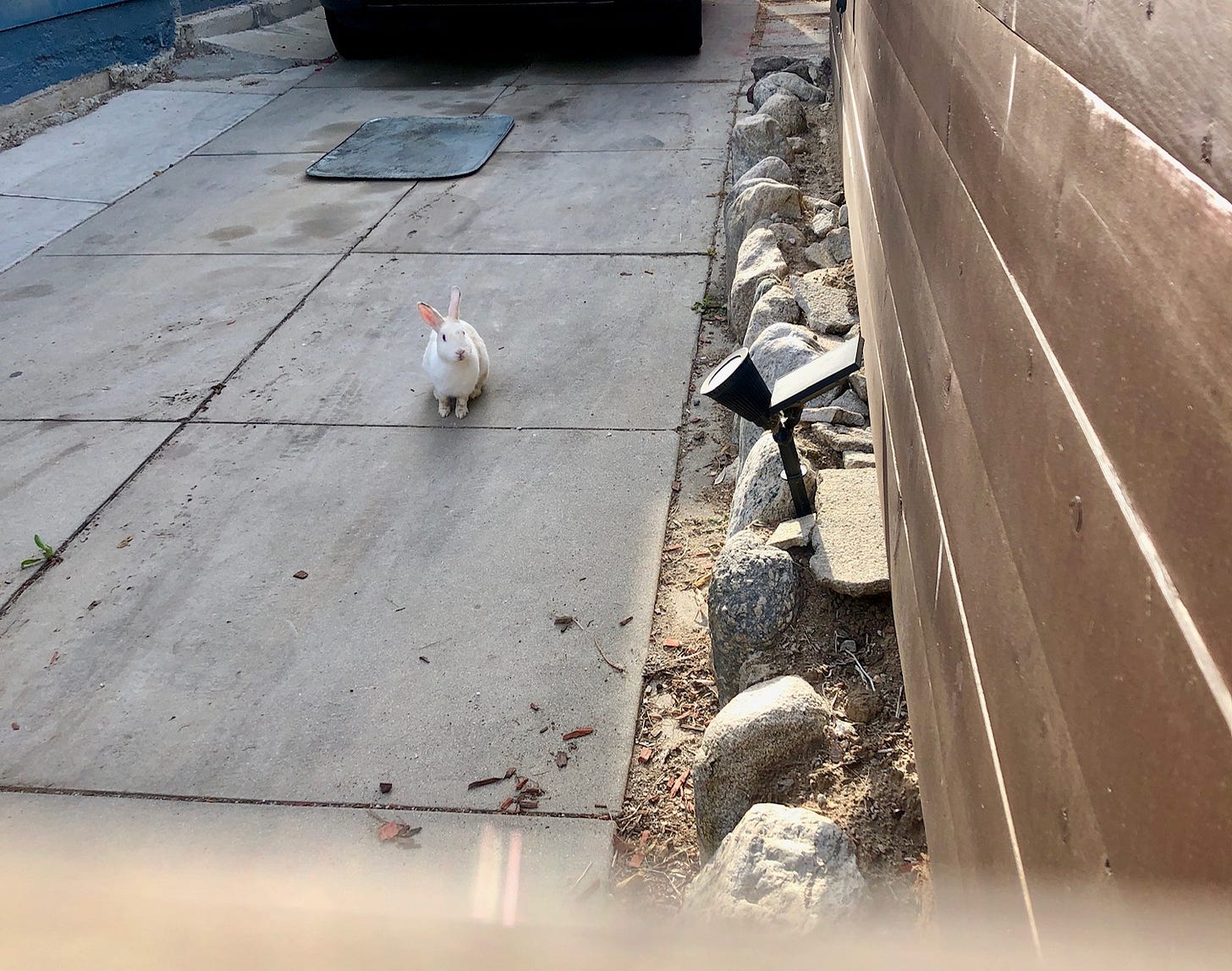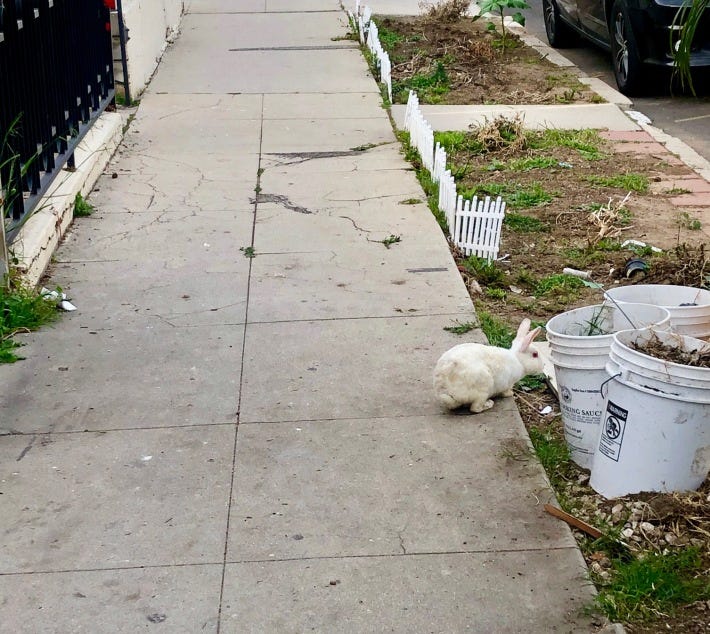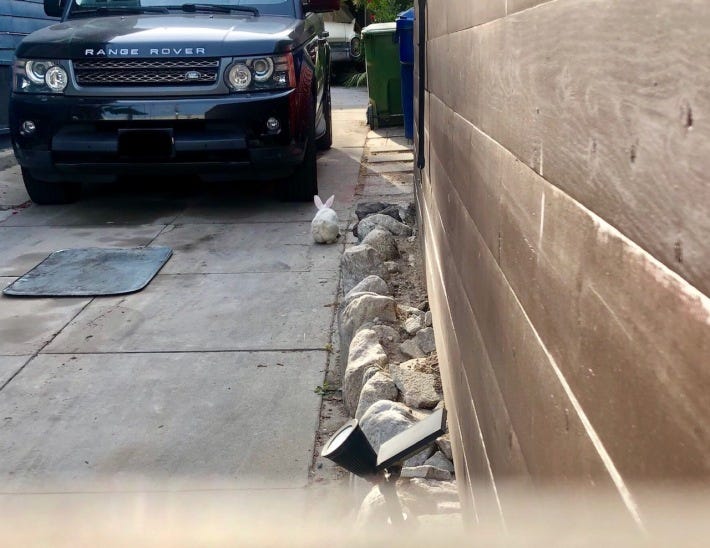The Trouble Nextdoor
Is it possible to ethically use problematic platforms like Nextdoor? Is there any point?
Last week, while walking around my Los Angeles neighborhood, I spotted a rabbit. Not just any rabbit, a white rabbit.
It’s hard to convey how disarming this was in the moment. It sounds stupid honestly, but it’s not like seeing a bear or a snake or even a cat. A white rabbit in the “wild” (separate even from the cultural pervasiveness of Alice in Wonderland) is a strange, fascinating, surreal sight. At the time of the sighting I was on the phone with a friend who was telling me about her partner’s new job and right in the middle of one of her sentences I shouted at full volume “there’s a rabbit!!!!!” I then snapped the photo below to make it clear that this wasn’t just any rabbit. She agreed.
From there I narrated to my friend—and anyone in the immediate vicinity—my attempt to follow the rabbit, assess its state of being, and then, finally, my futile endeavor to secure it for safe passage to its owner or a local animal rescue facility.
The little Bunnicula had other ideas. It slipped under a gate and we stared at each other for a good long while, before it hop, hop, hopped out of sight.
It was at this point that I myself became the living embodiment of the iconic white rabbit, hurriedly circling the street, checking the time and fussing over what to do. In short, there wasn’t much to do, unless I wanted to start knocking on the doors of everyone on the block (I didn’t) or calling animal control over a rabbit I no longer had eyes on (I was not in the mood to be laughed at). And so I went home. I fretted some more. I sought counsel from friends, family, and coworkers. A few themes emerged. One, this was definitely not a wild creature, but a pet that had escaped or been abandoned. The second was more complicated. Through caveats, furrowed brows, sighs, shrugs, a repeated, tortured question: “Maybe try Nextdoor?”
Nextdoor, as I’m sure 90 percent of you reading this know, is the social network that bills itself as a place “where communities come together to greet newcomers, exchange recommendations, and read the latest local news.” It is, in fact, more commonly a message board for absurdity and racism.
I had considered Nextdoor myself from the very beginning. The idea circled in my head like the spoon in a cup at a mad tea party full of unhinged strangers shouting their problems into the ether. I don’t know exactly what Nextdoor is like where you live, but I can make some assumptions, because the problems with the platform have been chronicled as far back as 2015 (the app launched in 2011) and can perhaps most succinctly be summarized by a criticism from Rep. Alexandria Ocasio-Cortez, who tweeted last year that Nextdoor needs to “publicly deal w/ their Karen problem.”
To be far less concise, Nextdoor is a well known tool for police and a cultivator of snitch culture. Last year, as Black Lives Matter protests swept the country following the murder of George Floyd, the company was called out after its moderators censored BLM posts and favored handwringing, NIMBY posts about property damage. The company’s “official stance” was one of support for the movement, though its attempts to meaningfully combat its own racist issues have been middling. At the time, even the person behind the meme account Best of Nextdoor (an account that Nextdoor itself seems humorless about) felt compelled to speak up about it, which is deeply 2020 in every way. And it should be noted that the mods, known as Neighborhood Leads, are volunteers who didn’t receive any training until last year’s blow-up. (They now receive anti-bias training.)
The problem of hate speech is so bad on Nextdoor that just this week, the company announced it was introducing an “anti-racism notification" which will ask users to think twice before posting potentially offensive content. The app also has a Kindness Reminder, which it claims has led to a 30 percent reduction in “incivil content.” Both pop-ups are similar to Twitter’s “read before you retweet” prompt, which it claims leads to a 40 percent increase in article reading.
Is any of that true? I have no idea, but my hunch is that regardless of whether it is, pop-ups won’t solve the racism in tech or online. We’ve seen a palpable uptick in “fear-based social media" and technology just in the last decade with things like the Ring security systems and the Citizen app—tools that have empowered neighborhood watch and surveillance wannabes who obsessed with tracking crime. The problem is the tech and the problem is the people.
One of the actually interesting things about Nextdoor is that it offers both the promise of hyper-locality and the anonymity of the internet. Your name is there, you have a verified address, but you’re still behind a computer. The risks, the intimacy—and for many users, the threat—of the interactions that happen there are both remote and immediate.
I logged onto the site while writing this. Here are the topics I encountered at the top of my feed:
Spectrum outage
The quality of local DMVs
Security camera footage hoping to ID a catalytic converter thief
Ring camera footage titled “Creepy Prowler / Return Visits”
Request for rain gutter installation
Selling a dog sweater ($8!!!)
Complaint about a rooster
Someone trying to ID a skull (the consensus was possum or coyote)
A “dangerous barking dog” post in which someone advised using pepper spray
In my limited use I would say this is relatively typical for where I live. A handful of people seeking help or guidance in earnest, a handful of people complaining, and a handful of people posting harmful photos or videos of people they’ve deemed dangerous, usually with racist or classist overtones. Those racist and classist posts are always about theft, the threat of home invasion, or general aggravation at our unhoused neighbors, who are often framed as the enemy. They also always get tons of comments.
(I won’t ID the person here, but there’s a minor celebrity—so minor that I’m not sure anyone else has clocked them, very wealthy I’m sure, but largely anonymous—who’s stepped in on more than one occasion offering substantive solutions regarding unhoused and those with mental health crises, which has made me wonder when we’ll get a sweeping analysis of celebrity behavior on this particular app.)
Frankly, I rarely use Nextdoor. It is almost exclusively a tool I consult when there’s a loud noise, a pervasive smell, fireworks I can’t figure out (aka a loud noise), or a minor mystery I can’t solve. Still, when I do browse the site, I always find myself confused and heartened by the presence of people with common sense and some desire to contend with the constant stream of hate and insanity present there. There are always people calmly suggesting that we consider approaching the unhoused with compassion and humanity, or patiently inquiring why someone is posting that they aren’t getting a vaccine, or offering their help or advice to someone. It’s notably different from what’s happening on Facebook, though I don’t understand it any more than I understand what’s happening on Facebook.
I did end up posting about the white rabbit in the end, though I don’t really know what I thought would happen. I had vague fears of awful engagement, but they were overwhelmed by my lesser judgement, I guess. I was grasping for any resolution or sense of control—historically a great reason to take to social media! I posted a photo of the animal and a description of my encounter, along with an inquiry as to whether anyone had any information. This is what I got back over the course of several days:
Again, I don’t know what I expected, but it wasn’t this exactly. I didn’t engage with any of it (very happy about that choice) and I assume I’ll never know the story of the white rabbit. I walk by that block nearly every day. I will probably never speak to anyone who lives there.
The experience of dipping my toes in the waters of Nextdoor was ultimately a benign one. And while I'm very glad it didn't devolve into a shouting match on rodent infestations or animal rights, the pointlessness of the post speaks to the bigger issue with NextDoor. Principally: who exactly is it for? All evidence indicates that it's impractical at best and treacherous at worse—an online community in search of connection and meaning, and coming up extremely short. The end result, over and over again, is hollow. It's not a space to "greet newcomers, exchange recommendations, and read the latest local news," as its marketing promises, and it certainly isn't one for fostering a larger sense of belonging. The people in my feed don't reflect the neighbors I know IRL, who would stop to ponder the rabbit problem with me, offer context, or throw out some ideas. In other words, they would try to help. So many online communities are places of real connection, it's important to note that. But such connections are few and far between on Nextdoor.
Many tech sites and writers have been covering the problems with Nextdoor and its counterparts for years and with far greater depth and nuance than I can. None of this is new, and I don’t have any solutions to offer. But there’s really nothing like a pandemic to make you spiral down into the corners of your mind after seeing a white rabbit and stop to consider the people next door and on the other side of the screen, and where they intersect.
Last year a Nextdoor spokesperson told The Verge: “We want your neighborhood on Nextdoor to reflect your actual neighborhood, and therefore being community moderated is important.”
This is a dumb statement from a dumb startup. Despite being used by millions of being in hundreds of thousands of communities, Nextdoor doesn’t reflect neighborhoods because it isn’t a welcoming or safe place for many users. And while that remains true, it will never be a reflection of the communities it claims to represent, it will always be a grotesque funhouse mirror (which I guess, is itself a kind of proper reflection). And while that should theoretically be a problem for a platform, we know better. This isn’t our first rodeo.
The pandemic, naturally, has exacerbated all of this. During a time when we’re more isolated than ever, posting online has become one of our primary modes of social engagement, but it’s still as useless and fraught as ever. (This is especially apparent during a year in which mutual aid efforts have supported and sustained communities when the government did not.) The problems we see on sites like Nextdoor do exist in the real world, but dealing with them on a message board simply ain’t it. An app is never going to represent a neighborhood, and it should have no power in deciding what a neighborhood is or what it should be. The solution, as always, is to log off. It’s not that easy, I know.
The absolute dumbest thing about all this is that when I read the very first reply on my post, I didn’t get it. The reply, “Go ask Alice,” is a joke, but I thought someone was suggesting that there was a woman named Alice I could speak to about the wayward mammal population in our area. I thought there might be a neighbor I could actually connect with. I wish there was. Maybe someday soon, as the world opens up, there will be.






